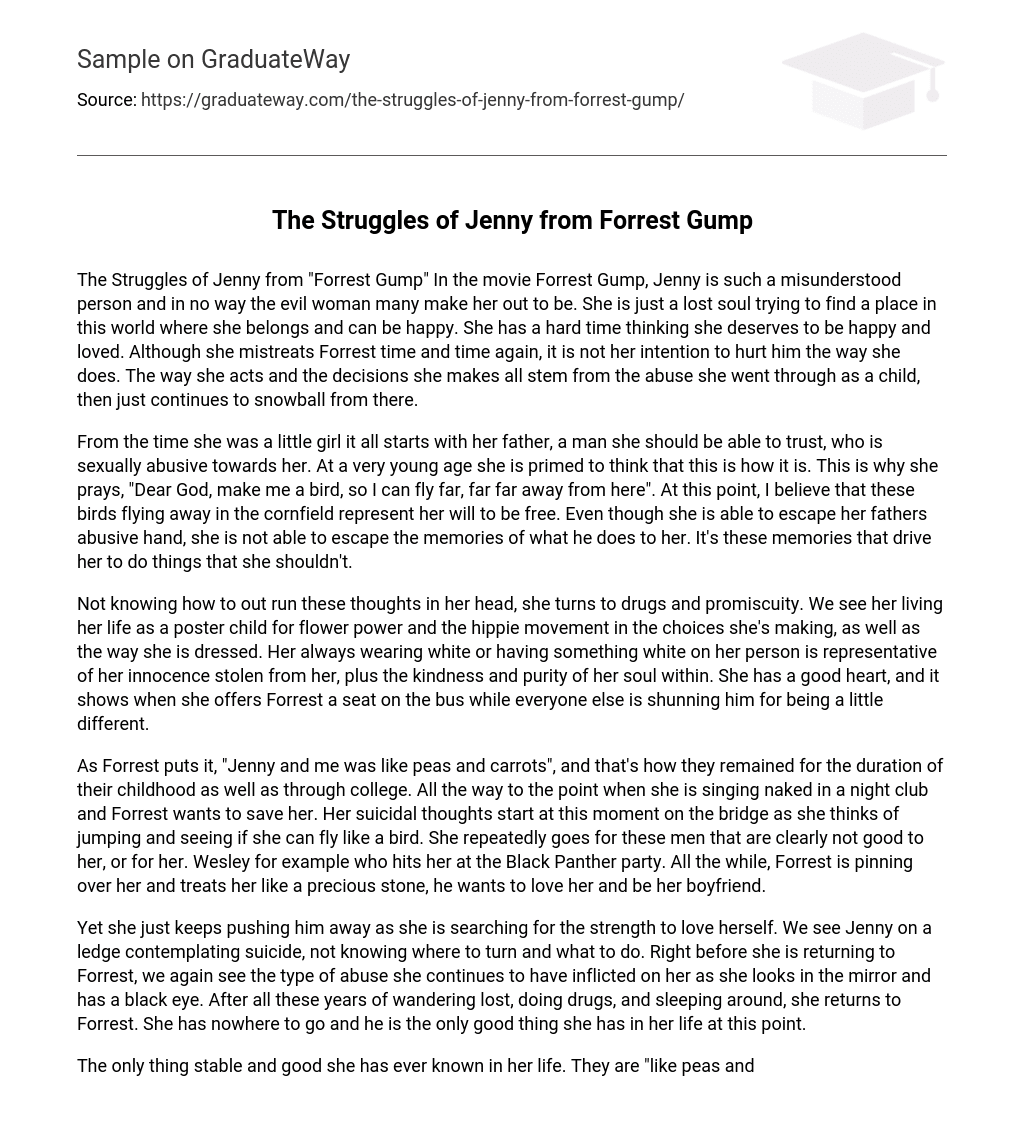In “Forrest Gump”, Jenny’s struggles depict her as a misunderstood individual, as opposed to the villainous portrayal imposed on her. Her search for belonging and happiness reflects her status as a lost soul. Sadly, she struggles to believe she deserves love and happiness. Despite repeatedly mistreating Forrest, she never intends to purposefully hurt him. Her actions and choices are a direct consequence of the childhood abuse she endured, which further exacerbate her situation.
From a young age, the protagonist is subjected to sexual abuse by her father – a person she should have been able to trust. This experience molds her perception of the world, leading her to believe that such inappropriate behavior is normal. Desperate for liberation, she turns to prayer, pleading with God to transform her into a bird capable of flying far away from her current predicament. The imagery of birds soaring above the cornfield symbolizes her longing for freedom. However, even after managing to escape her father’s abusive grip, the haunting memories of his actions continue to haunt her. These memories serve as driving forces behind her engagement in regrettable actions.
In an effort to escape these troubled thoughts, she resorts to substance abuse and engaging in risky behavior. Her choices and appearance align with the flower power and hippie movement, embodying the ideal figure. The consistent presence of white in her attire signifies both the loss of her innocence and the inherent goodness and purity in her character. Despite societal rejection due to his uniqueness, she demonstrates her compassionate nature by inviting Forrest to take a seat on the bus.
According to Forrest, he and Jenny were like peas and carrots, and this strong bond continued from their childhood to college. However, their relationship took a troubling turn when Jenny started singing nude at a nightclub and Forrest felt the need to rescue her. It was on a bridge when she contemplated suicide and wondered if she could fly like a bird. Unfortunately, Jenny repeatedly chose partners who were harmful to her, such as Wesley who hit her at the Black Panther party. Throughout it all, Forrest yearned for her and cherished her like a precious gem – he longed to be her boyfriend and shower her with love.
However, even though she is searching for self-love, Jenny still keeps her distance from him. She stands on a ledge, feeling torn and uncertain about what actions to take. In the process of getting ready to reunite with Forrest, she once again confronts the visible proof of the abuse she suffers by seeing her black eye in the mirror. Having spent years wandering aimlessly, using drugs, and engaging in promiscuity, Jenny eventually finds comfort in Forrest. With no other options available to her, he becomes the only positive influence in her chaotic existence.
The only thing she has ever experienced in her life is the stability and goodness. Forrest compares their connection to “peas and carrots.” Although she faces financial difficulties, her kind nature is apparent when she gives him a pair of running shoes. While walking, they come across Jenny’s childhood home, forcing her to confront the traumas from her past. This house is where the abuse started years ago and is linked to all the negative experiences she has gone through. The intense emotions of guilt, anger, and regret become overwhelming for her to handle at once.
In an act of anger and rebellion, she throws rocks at her father’s house, trying to escape her painful past. However, this futile effort fails to bring any comfort or release. Forrest’s statement, “I guess sometimes there just aren’t enough rocks,” shows that it is not always possible to forget unfortunate memories. Although she briefly experiences happiness, she falls back into depression. Forrest proposes marriage to her, but she feels unworthy and keeps pushing him away. Going even further, she doubts his intelligence and suggests he doesn’t understand love.
Forrest’s response to Jenny is that, despite not being intelligent, he understands the concept of love. Subsequently, she declares her love for him and exhibits it physically, aiming to conceive as a means of making a positive change in her life. However, consistent with Jenny’s behavior, she departs abruptly without saying a word. Now alone and pregnant, she must confront her past, regardless of her personal wishes. Acknowledging the errors she has made throughout her life requires immense strength and courage; furthermore, recognizing her own flaws demands even more bravery. This exemplifies the extraordinary traits within Jenny’s character as a woman.
Instead of contacting Forrest regarding their baby, she decides to become self-sufficient and independent. This entails taking care of herself and another individual’s life. During one workday, Jenny witnesses Forrest on television as he runs across the entire country. This inspires her to contact him and inform him about their child. Eventually, after receiving a letter from her, Forrest visits Jenny’s apartment where little Forrest makes his entrance and Jenny introduces big Forrest to his son for the very first time.
While sitting in the park, Jenny reveals to Forrest that she is suffering from a terminal virus. In a gesture of kindness, Forrest invites Jenny and their son to live with him and care for her. To his surprise, Jenny proposes to him and he happily agrees. This marks a turning point for Jenny as she confronts her past and becomes capable of finding happiness, even if it is only fleeting. Having spent many years feeling lost, she finally finds peace and joy in her life.
Shortly after their marriage, Jenny dies in a beautiful ceremony held at their home. Forrest honors her memory by demolishing her childhood home. Her final resting place is beneath the big willow tree, where she and Forrest shared countless joyful moments. Ultimately, she achieves her long-desired freedom. At the conclusion of the film, we witness birds flocking to her resting place, symbolizing her liberation and discovery of a true home.





